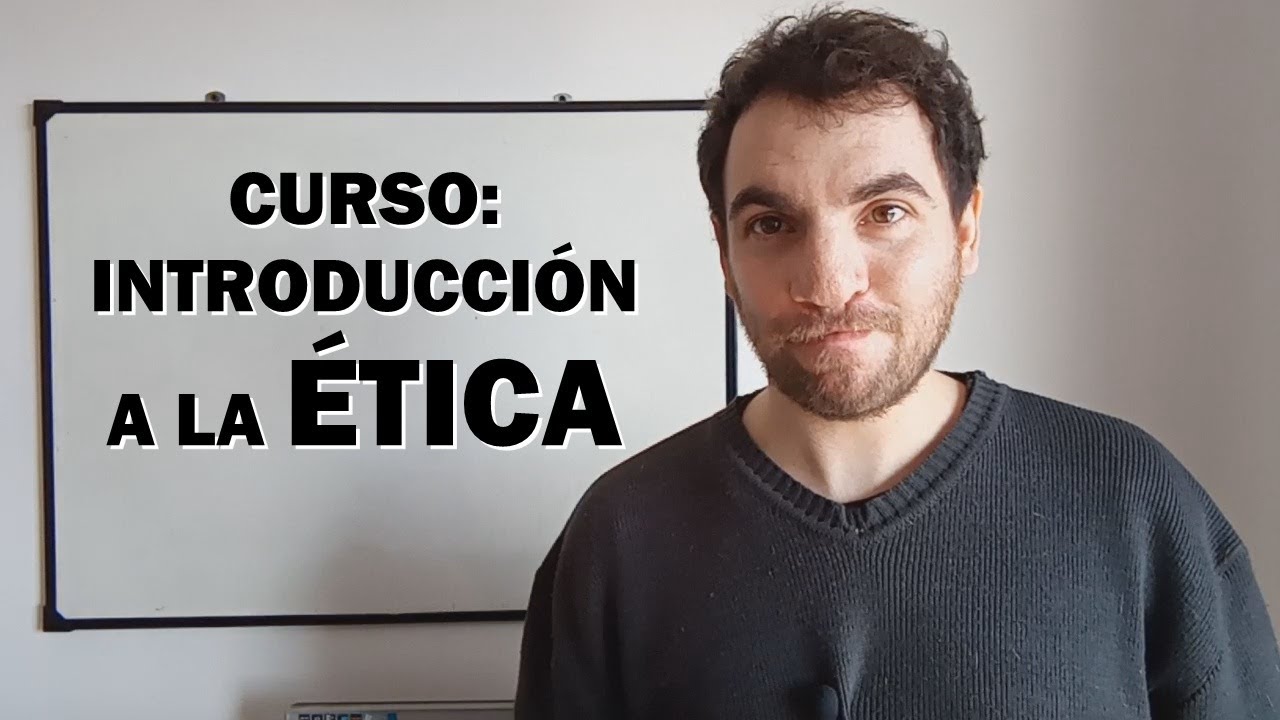Semester Ethics Course condensed into 22mins (Part 1 of 2)
Summary
TLDREl script de video ofrece una visión general del curso de ética, abarcando desde el utilitarismo de Jeremy Bentham hasta la filosofía moral de figuras prominentes como Immanuel Kant, Friedrich Nietzsche, y Aristóteles. Se discuten las teorías de la moralidad basadas en los resultados de nuestras acciones, como el utilitarismo, y contrastan con enfoques como el deontología de Kant, que se centra en las intenciones detrás de las acciones. Además, se exploran conceptos como la eudaimonia de Aristóteles, que relaciona la virtud con la felicidad y el éxito humano. La discusión también abarca la relevancia de la proximidad y la responsabilidad colectiva en la moralidad, como se plantea en el ejemplo de la charca poco profunda de Peter Singer. Finalmente, se cuestiona la existencia de hechos morales objetivos y se sugiere que la respuesta de Nietzsche a la importancia de la moralidad es que no debemos ser moralmente, ya que la moralidad es para los perdedores.
Takeaways
- 📚 El utilitarismo, propuesto por Jeremy Bentham, afirma que las acciones moralmente correctas son aquellas que producen la mayor cantidad de placer menos dolor.
- 🔍 Utilitarismo y su enfoque en los resultados de las acciones contrastan con la teoría moral de Immanuel Kant, que no se centra en las consecuencias.
- 🎲 Bentham argumenta que todos los placeres son igualmente valiosos, sin importar su origen o complejidad.
- 🤔 El pensador del siglo XX, Robert Nozick, cuestiona utilitarismo con su experimento del 'maquinaria de experiencias', sugiriendo que hay aspectos de la vida más importantes que el placer.
- 👥 Utilitarismo podría implicar que sacrificar a un inocente para evitar un alboroto es moralmente correcto, lo que somete a debate la teoría.
- 💰 Peter Singer argumenta que las personas en sociedades ricas tienen una obligación moral de donar a causas humanitarias en lugar de gastar en lujos.
- 👶 El ejemplo de la 'charca poco profunda' de Singer compara la responsabilidad moral de ayudar a alguien en peligro inmediato con la obligación de donar para evitar la hambruna.
- 🚫 La teoría de Kant, la deontología, se centra en las intenciones y los principios morales subyacentes a las acciones, no en sus consecuencias.
- 🤝 Aristóteles sostenía que la virtud y la realización de nuestras funciones humanas (racionalidad) eran la clave para la eudaimonia, un estado de felicidad y logro.
- 🚫 Friedrich Nietzsche cuestionaba la moralidad convencional, sugiriendo que la moralidad es para los débiles y que los individuos deben crear sus propios valores.
- 🧐 La discusión sobre si existen hechos morales objetivos y si las reglas morales son independientes de nuestras opiniones es un tema central en la filosofía moral.
Q & A
¿Qué es el utilitarismo y qué principio moral fundamental propone?
-El utilitarismo es una teoría moral y ética introducida por Jeremy Bentham, que sostiene que lo que importa moralmente para la bondad de una acción son sus consecuencias, es decir, la cantidad de placer menos el dolor que produce.
¿Cómo se relaciona el utilitarismo con el concepto de 'hedonismo'?
-El utilitarismo se basa en el hedonismo, que es la idea de que el placer y el dolor son los únicos factores que importan moralmente para una persona. Según esto, el valor moral de una acción radica en la cantidad de placer que produce.
¿Qué es la teoría de la consecuencia en la moralidad y cómo se relaciona con el utilitarismo?
-La teoría de la consecuencia es una amplia categoría de teorías morales que enfatizan la importancia de las consecuencias de nuestras acciones para determinar su moralidad. El utilitarismo es una versión de la teoría de la consecuencia, ya que evalúa la moralidad de una acción basándose en sus resultados.
¿Cuál es la crítica de Robert Nozick al utilitarismo a través de su experimento de pensamiento de la 'máquina de experiencias'?
-Robert Nozick argumenta que la 'máquina de experiencias', que proporciona cualquier experiencia deseada, revelaría que hay aspectos de la vida que son importantes para nosotros más allá del placer. La resistencia a conectarse a tal máquina sugiere que hay elementos como el control de nuestras vidas, la amistad y la acción real que son valiosos por sí mismos, no solo por el placer que proporcionan.
¿Qué es la teoría de Kant y cómo difiere de la teoría utilitarista?
-La teoría de Kant, conocida como deontología, se centra en las intenciones y el 'máximo' subyacente a una acción, en lugar de en sus consecuencias. Para Kant, una acción es moralmente permisible si su máxima podría ser aceptada por todos los involucrados en la acción, lo cual contrasta con el enfoque utilitarista que se centra en las consecuencias.
¿Por qué podría ser problemático el enfoque utilitarista en situaciones donde se requiere sacrificar a una persona inocente para evitar un alboroto mayor?
-Según el utilitarismo, sacrificar a una persona inocente para evitar un alboroto que causaría más daño podría ser moralmente justificado si se produce más placer que dolor en conjunto. Sin embargo, esto puede ser moralmente cuestionable, ya que implica que se puede justificar un acto inmoral (injusticia hacia una persona inocente) en aras de un resultado mayormente positivo.
¿Qué argumenta Peter Singer en su artículo 'Famine, Affluence and Morality' y qué implicaciones tiene esto para nuestra responsabilidad moral?
-Peter Singer argumenta que las personas en sociedades ricas tienen una obligación moral de donar dinero que normalmente gastarían en lujos para salvar vidas en situaciones de hambruna. Utiliza el ejemplo de un niño ahogándose en un charco poco profundo para ilustrar que es moralmente obligado ayudar si se encuentra en una posición de poder ayudar.
¿Cómo responde Aristóteles a la pregunta de qué es lo que hace que una vida humana sea exitosa o 'eudaimónica'?
-Aristóteles sostiene que la eudaimonia, o la felicidad y el éxito en la vida, radica en la realización de la función o propósito inherente al ser humano, que él identifica como la actividad que involucra la razón, es decir, ejercer las virtudes y actuar en consecuencia.
¿Qué es la filosofía de Friedrich Nietzsche en relación con la moralidad y cómo difiere de las perspectivas de Aristóteles?
-Friedrich Nietzsche es conocido por su crítica a la moralidad tradicional y su rechazo de las nociones de bondad y virtud. En contraste con Aristóteles, quien ve la moralidad como un camino hacia la eudaimonia, Nietzsche argumentaría que la moralidad es para 'los perdedores' y que la verdadera libertad y excelencia humanas requieren de superar las convenciones morales establecidas.
¿Qué es el problema de H. J. McCloskey con la teoría utilitarista en relación con el ejemplo del alguacil?
-H. J. McCloskey argumenta que el utilitarismo falla al sugerir que el alguacil debería enmarcar a una persona inocente para evitar una riota, pues esto implica un acto inmoral (enmarcar a alguien inocente). McCloskey cree que la moralidad no puede ser reducida a una cuestión de cálculo matemático de placer y dolor, y que ciertas acciones están intrínsecamente malas, independientemente de las consecuencias.
¿Qué es la cuestión de si hay hechos morales objetivos y cómo se relaciona esto con la filosofía de John Locke y David Hume?
-La cuestión de si hay hechos morales objetivos se refiere a si existen reglas morales que son verdaderas independientemente de nuestras opiniones o sentimientos. John Locke y David Hume contribuyeron a la discusión sobre la naturaleza de la moralidad y la forma en que entendemos la objetividad. Mientras que Locke podría haber influenciado la idea de que la moralidad está basada en principios racionales, Hume podría haber enfatizado la importancia del sentimiento y la empatía en la formación de nuestras nociones morales.
Outlines

Esta sección está disponible solo para usuarios con suscripción. Por favor, mejora tu plan para acceder a esta parte.
Mejorar ahoraMindmap

Esta sección está disponible solo para usuarios con suscripción. Por favor, mejora tu plan para acceder a esta parte.
Mejorar ahoraKeywords

Esta sección está disponible solo para usuarios con suscripción. Por favor, mejora tu plan para acceder a esta parte.
Mejorar ahoraHighlights

Esta sección está disponible solo para usuarios con suscripción. Por favor, mejora tu plan para acceder a esta parte.
Mejorar ahoraTranscripts

Esta sección está disponible solo para usuarios con suscripción. Por favor, mejora tu plan para acceder a esta parte.
Mejorar ahoraVer Más Videos Relacionados

13 filósofos que cambiaron el mundo

Ética Kantiana y Utilitarismo

Periodos De La Filosofía Antigua - FILOSOFÍA || Resumen - Explicación

Kant - Fernando Savater - Aventura del pensamiento

Justicia ¿Qué debemos hacer? | Michael J. Sandel

FILOSOFÍA EN EL PERÚ: Principales corrientes del pensamiento hasta la actualidad

INTRODUCCIÓN A LA ÉTICA | Clase 1: Ética y Moral | Teleológicas y Deontológicas | Problemas éticos
5.0 / 5 (0 votes)